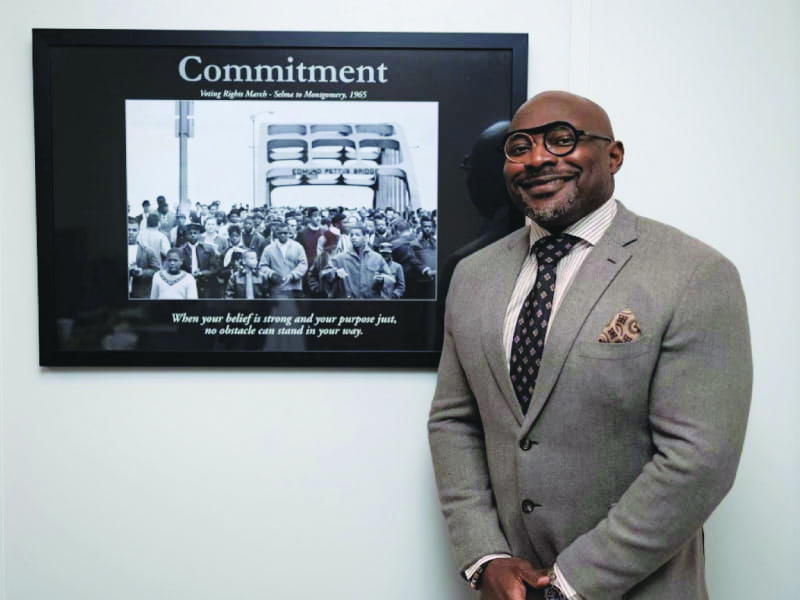Recognized for work providing access to quality health care for all
Special to The Bolivar Bullet
When Dr. Foluso Fakorede moved to the Mississippi Delta in 2015, he was shocked — and disturbed — by high rates of peripheral artery disease and other cardiovascular conditions among Black people.
“It’s very common here to go to the grocery store and see a patient walking with a dialysis catheter in their neck or an amputee using a walker on tennis balls,” said Fakorede, an interventional cardiologist in Cleveland, Mississippi. “It makes you wonder: Is this America? We are a very wealthy nation that touts our health care, but our outcomes are not matching our spending on treatment.”
To help remedy persistently poor outcomes and lack of preventive care in the Mississippi Delta region, an area with a particularly high percentage of Black residents, Fakorede established Cardiovascular Solutions of Central Mississippi. His mission is to educate and provide access to quality health care for all.
Because of his lifesaving efforts, Fakorede is the recipient of this year’s Louis B. Russell Jr. Memorial Award, which the American Heart Association presents annually for outstanding service to under-resourced communities. Fakorede was honored on June 14 at Grammy Museum Mississippi during the AHA’s National Volunteer Awards virtual public ceremony.
Since starting the clinic, Fakorede has focused on making the community — including his patients (most of them low income), doctors and policymakers — aware of peripheral artery disease.
Fakorede said he’s especially dismayed at how common PAD-related amputations to legs, toes and feet are among Black people. Yet, many people he encounters in the region have never heard of the condition in which narrowed arteries reduce blood flow to arms or legs.
Consequently, Fakorede and his staff don’t just wait for patients to show up at the clinic. Instead, they go to congregations, schools, civic groups and medical schools to raise awareness about PAD.
Their efforts, which include aggressive screening and intervention strategies, led to an 88% decrease in amputation rates over a four-year period in the Delta.
Fakorede, who grew up in Nigeria and came to the United States when he was 14 years old, said he was inspired to become a doctor when he visited a clinic in Nigeria where his mother was a nurse. There, he saw how much respect patients and staff had for the resident cardiothoracic surgeon.
Later, Fakorede attended Rutgers University and Robert Wood Johnson Medical School, and he completed his training at NewYork-Presbyterian/Weill Cornell hospital and Cooper University Hospital in Camden, New Jersey.
Over the years, Fakorede realized that a confluence of factors contributed to significantly worse outcomes for Black and Hispanic patients. For example, Black people are up to three times more likely to develop PAD. Yet, they’re less likely to be diagnosed and promptly treated.
Also, peripheral artery disease hasn’t historically been taught in many medical schools, so some primary doctors aren’t familiar with the symptoms.
Another issue, Fakorede said, is the U.S. Preventive Service Task Force, an organization that makes recommendations about preventive services, doesn’t recommend early screening for patients who are high risk for PAD.
“The argument is that there’s not enough patient data, but how will you get that data if historically people of color have not been recruited in clinical studies?” Fakorede said. “Yet, we know that Black and brown patients are disproportionately dying younger and faster (from complications of diseases for which they are not being recommended for screening). And we know that social determinants play a huge role in patient health. It’s a systemic failure.”
In 2018, as part of a congressional delegation, Fakorede testified on Capitol Hill to support legislation to stop preventable amputations and improve PAD research, education and treatment.
He’s also served as co-chairperson of the PAD Initiative of the Association of Black Cardiologists and played a key role with the AHA’s PAD National Action Plan that aims to reduce PAD — and its disparate burden on people in under-resourced communities.
“It takes courage and perseverance in the face of injustice and structural racism in health care to address these issues,” Fakorede said. “But we have an opportunity to carve out tomorrow’s justice by bridging the gap in the inequities that have plagued marginalized communities for decades.”


